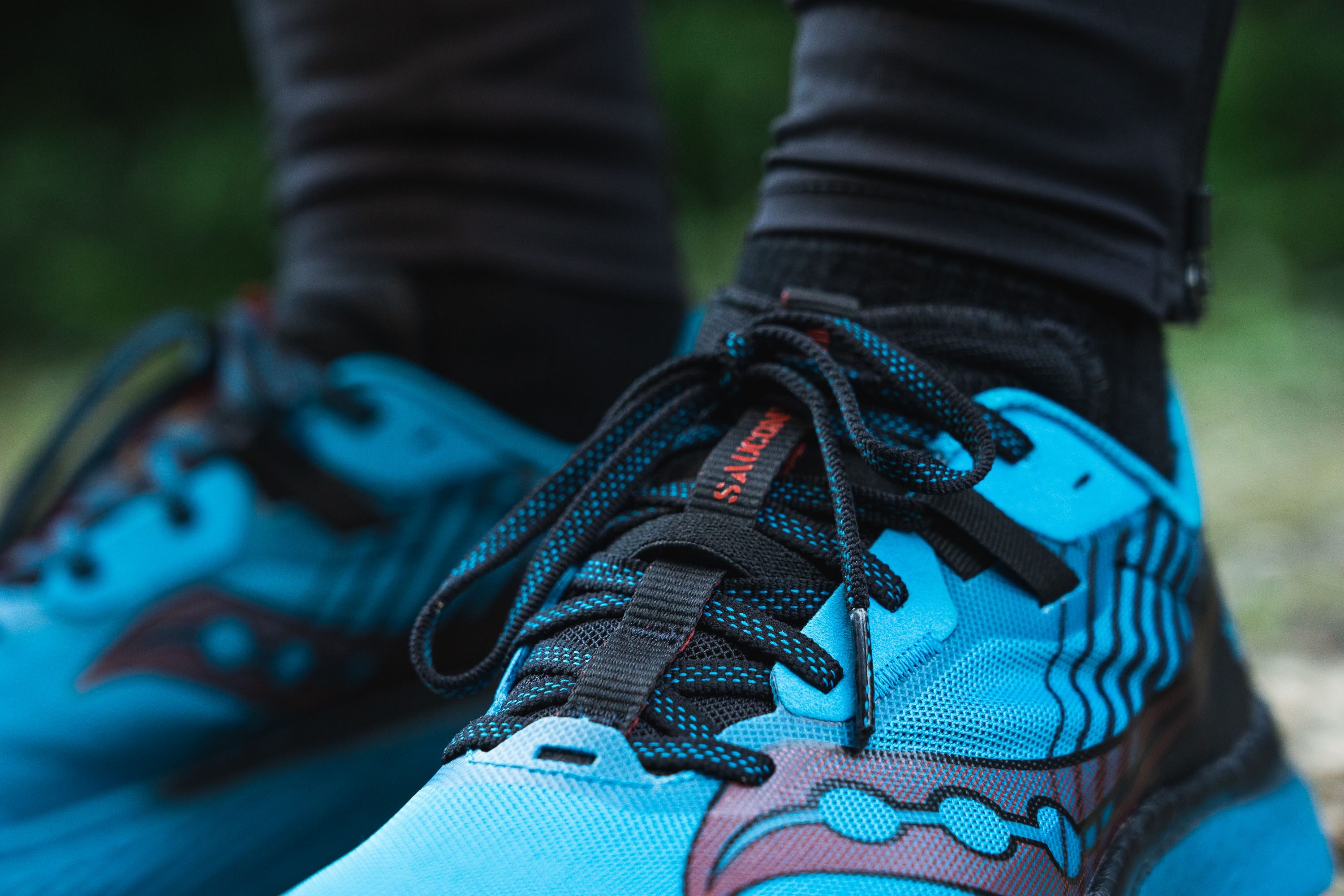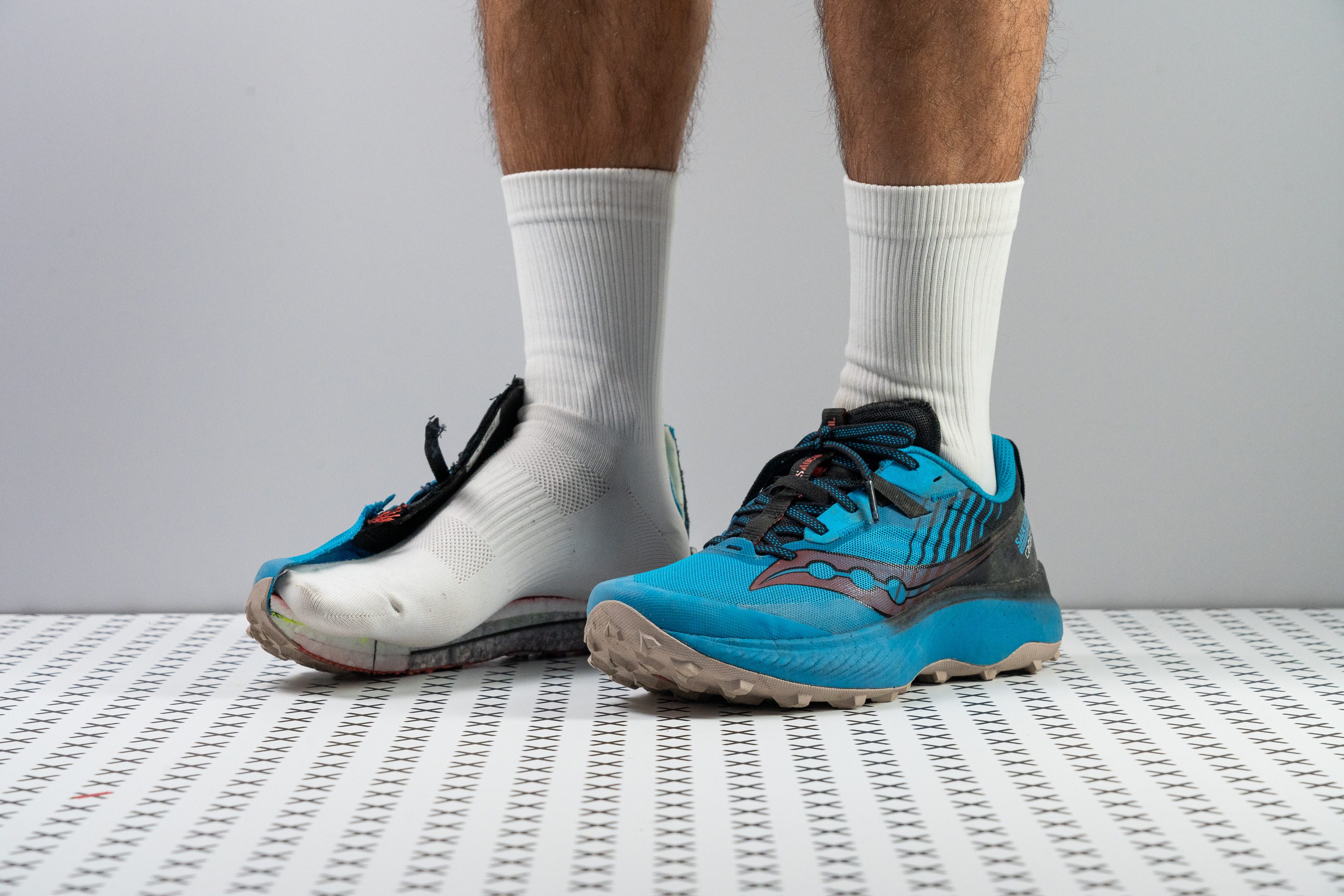Our verdict
- Our top pick in best running shoes for hiking
- Our top pick in best Saucony trail running shoes
Pros
- Fast as hell
- Comfort written all over it
- Super smooth ride
- Light AF
- Protection can't be more awesome
- Breathable under warm temps
- Toe box is ready for ultras
- Carbon plate is not harsh
- Grippy on wet, loose, and soft trails
- Also great for the roads
Cons
- Unstable at slow paces
- Loose heel
Audience verdict
Comparison
The most similar running shoes compared
+ + Add a shoe | |||||
|---|---|---|---|---|---|
| Audience score | 86 Good! | 84 Good! | 89 Great! | 91 Superb! | |
| Price | $200 | $130 | $225 | $260 | |
| Trail terrain | Moderate | Moderate | Moderate | LightModerate | |
| Arch support | Neutral | Neutral | Neutral | Neutral | |
| Weight lab Weight brand | 9.5 oz / 269g 9.1 oz / 258g | 9.1 oz / 258g 8.7 oz / 247g | 9.1 oz / 257g 8.8 oz / 249g | 10.5 oz / 299g 10.1 oz / 286g | |
| Drop lab Drop brand | 7.1 mm 6.0 mm | 7.1 mm 5.0 mm | 5.6 mm 5.0 mm | 11.8 mm 8.5 mm | |
| Strike pattern | Mid/forefoot | Mid/forefoot | Mid/forefoot | Heel | |
| Midsole softness | Soft | Balanced | Balanced | Soft | |
| Difference in midsole softness in cold | Small | Small | Small | Small | |
| Plate | Carbon plate | ✗ | Carbon plate | Carbon plate | |
| Toebox durability | - | Decent | Good | Very bad | |
| Heel padding durability | - | Decent | Bad | Good | |
| Outsole durability | - | Good | Good | Good | |
| Breathability | Moderate | Moderate | Moderate | Moderate | |
| Toebox width at the widest part | Narrow | Medium | Medium | Medium | |
| Toebox width at the big toe | - | Medium | Narrow | Medium | |
| Stiffness | Stiff | Moderate | Stiff | Stiff | |
| Difference in stiffness in cold | Small | Small | Small | Small | |
| Torsional rigidity | Stiff | Stiff | Stiff | Stiff | |
| Heel counter stiffness | Moderate | Moderate | Moderate | Moderate | |
| Lug depth | 3.4 mm | 3.6 mm | 3.6 mm | 3.0 mm | |
| Heel stack lab Heel stack brand | 33.4 mm 36.0 mm | 29.5 mm 23.0 mm | 37.4 mm 32.0 mm | 36.6 mm 38.0 mm | |
| Forefoot lab Forefoot brand | 26.3 mm 30.0 mm | 22.4 mm 18.0 mm | 31.8 mm 27.0 mm | 24.8 mm 29.5 mm | |
| Widths available | Normal | Normal | Normal | Normal | |
| Season | All seasons | All seasons | All seasons | All seasons | |
| Removable insole | ✓ | ✓ | ✓ | ✓ | |
| Orthotic friendly | ✓ | ✓ | ✓ | ✓ | |
| Ranking | #175 Bottom 32% | #197 Bottom 24% | #78 Top 30% | #24 Top 10% | |
| Popularity | #145 Bottom 44% | #131 Bottom 49% | #125 Top 49% | #100 Top 39% |
Who should buy the Saucony Endorphin Edge
If you're looking for any of the following, then we highly suggest not skipping on the Saucony Endorphin Edge:
- a trail running shoe with maximum protection and minimal weight
- an off-road racer that's grippy on wet, dry, and muddy terrains
- a shoe that can go fast and go the distance
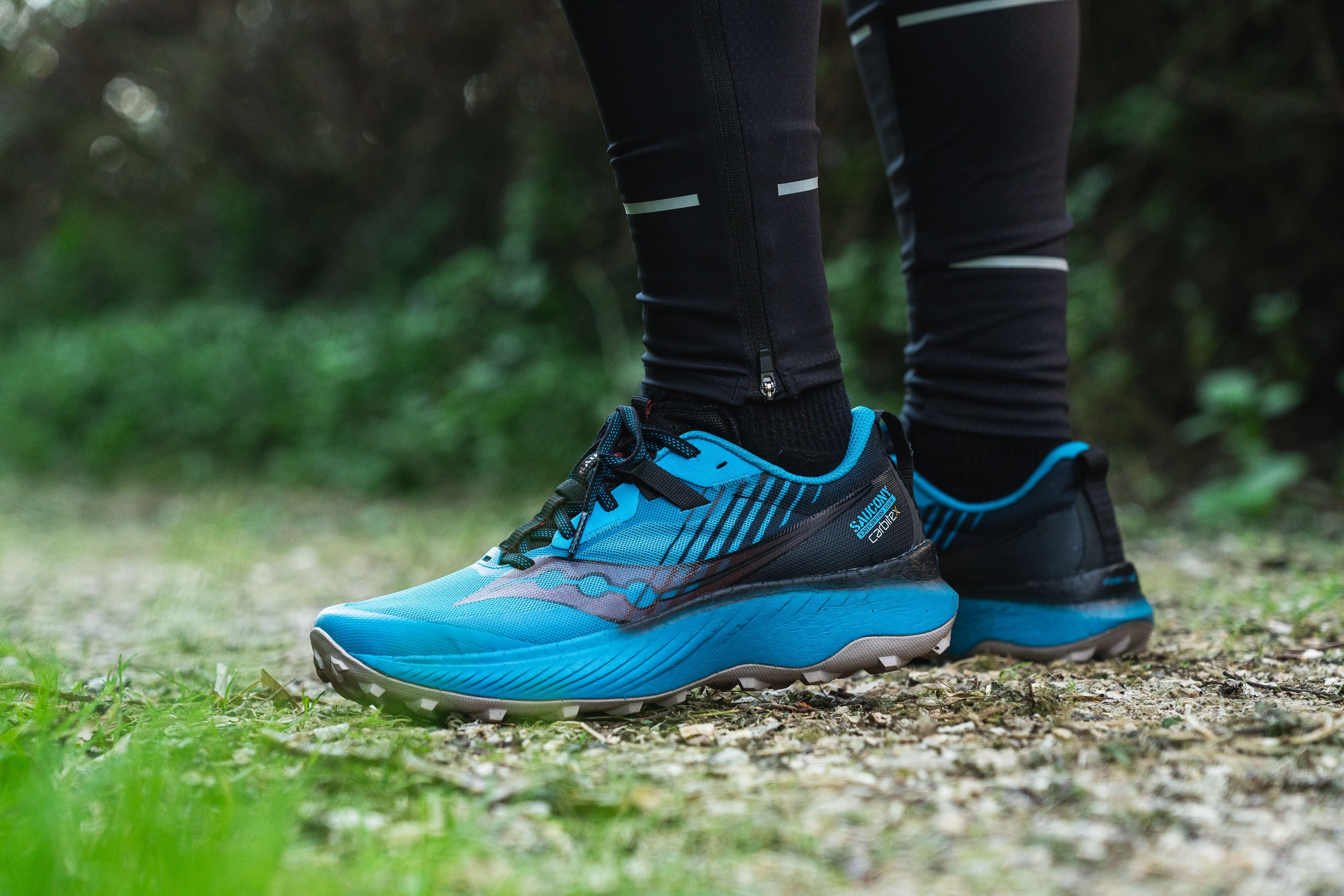
Who should NOT buy it
The heel fit of the Endorphin Edge is rather sloppy. If you crave a dialed-in rearfoot fit, chances are you'll love the Saucony Xodus Ultra better.
And if you want a consistently confident footing, regardless of pace, the Saucony Peregrine 13 is right up your alley.

Breathability is anything but a bust
Because it's downright awesome! The shoe's engineered mesh walks a fine line between ventilation and protection.
Saucony Endorphin Edge (left), Salomon XA Pro 3D GTX (right)
Using a smoke-pumping machine, we have visualized the shoe's ventilation capacity. Judging by the amount and speed of smoke, we gave the shoe 3 out of 5, where 5 is the most breathable. It is considered average for trail running shoes.
Minimal weight for maximum cushion
The Saucony Endorphin Edge packs a tremendous amount of foam. And this fact made us speechless when we found out that the shoe only weighs 9.5 oz (270g) in US men's 9!
This is a whole ounce lighter than trail shoes on average but with a few millimeters more cushioning! Hard to believe, really.

Nothing can top the Edge's protection and comfort
As mentioned, this trail racer is jam-packed with copious cushion. And this tells us two things:
- (1) it's one heck of a comfy shoe,
- (2) it will keep our feet and legs free from strain
And this is all thanks to the big fat slab of PWRRUN PB foam!
Getting the shoe on felt like heaven every time!
And if you don't want to feel any of that slapping against the surface, the Saucony Endorphin Edge is an effective and solid impact dampener.
Measuring the shoe's foam softness with a durometer also revealed that it is a good 40% softer than running shoes on average!
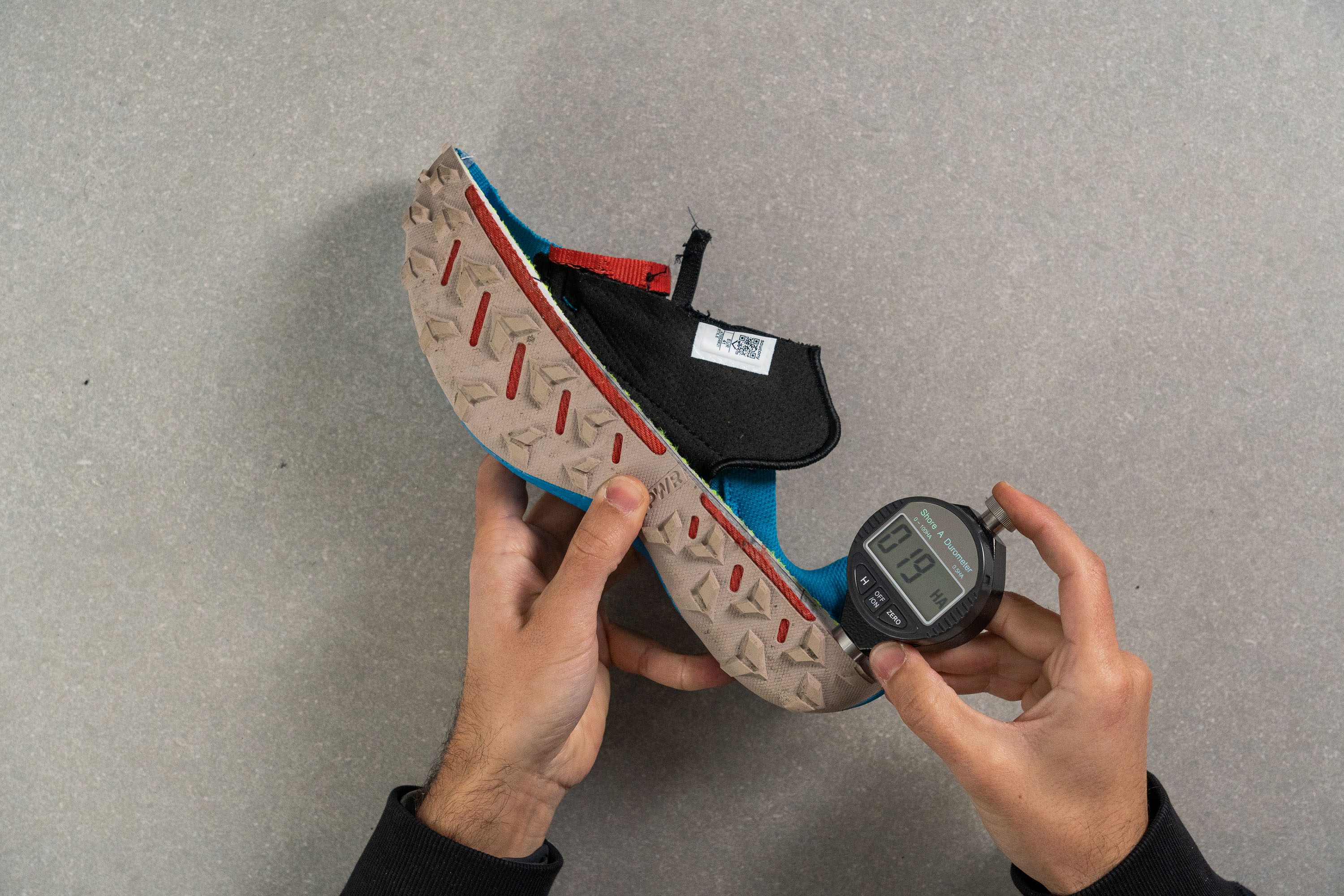
Good news for those who run in chilly weather - the foam doesn't get much firmer!
After spending 20 minutes in the freezer, the cushioning of the Endorphin Edge only got 14% firmer. For reference, most foams get around 26% stiffer on average.
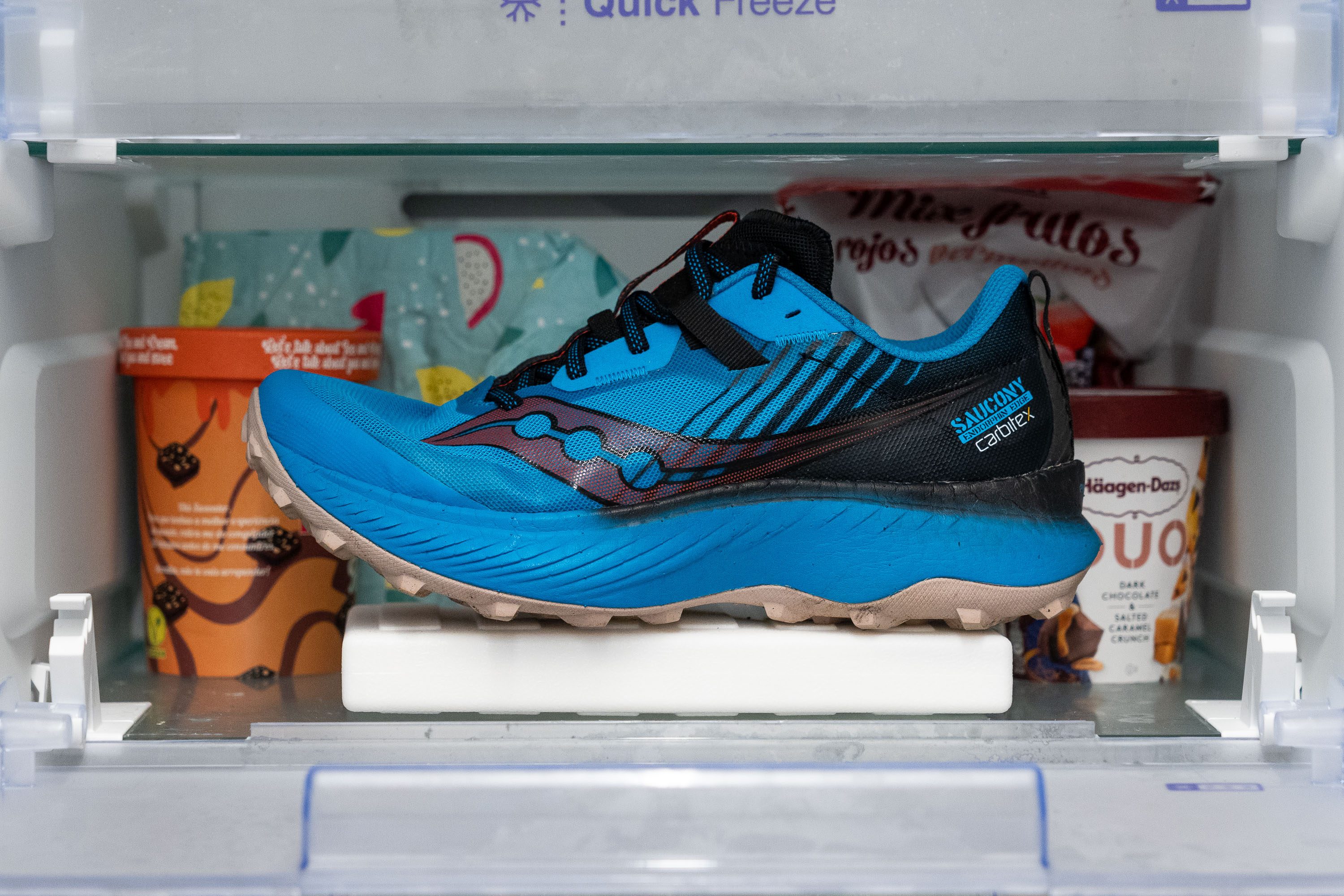
The Endorphin Edge is a generously cushioned trail shoe. Measuring its stack height with a pair of calipers, we found that it is 33.4 mm in the heel and 26.3 mm in the forefoot. Compared to running shoes on average, it is 0.6 mm thicker in the heel and 1.9 mm more in the forefoot.
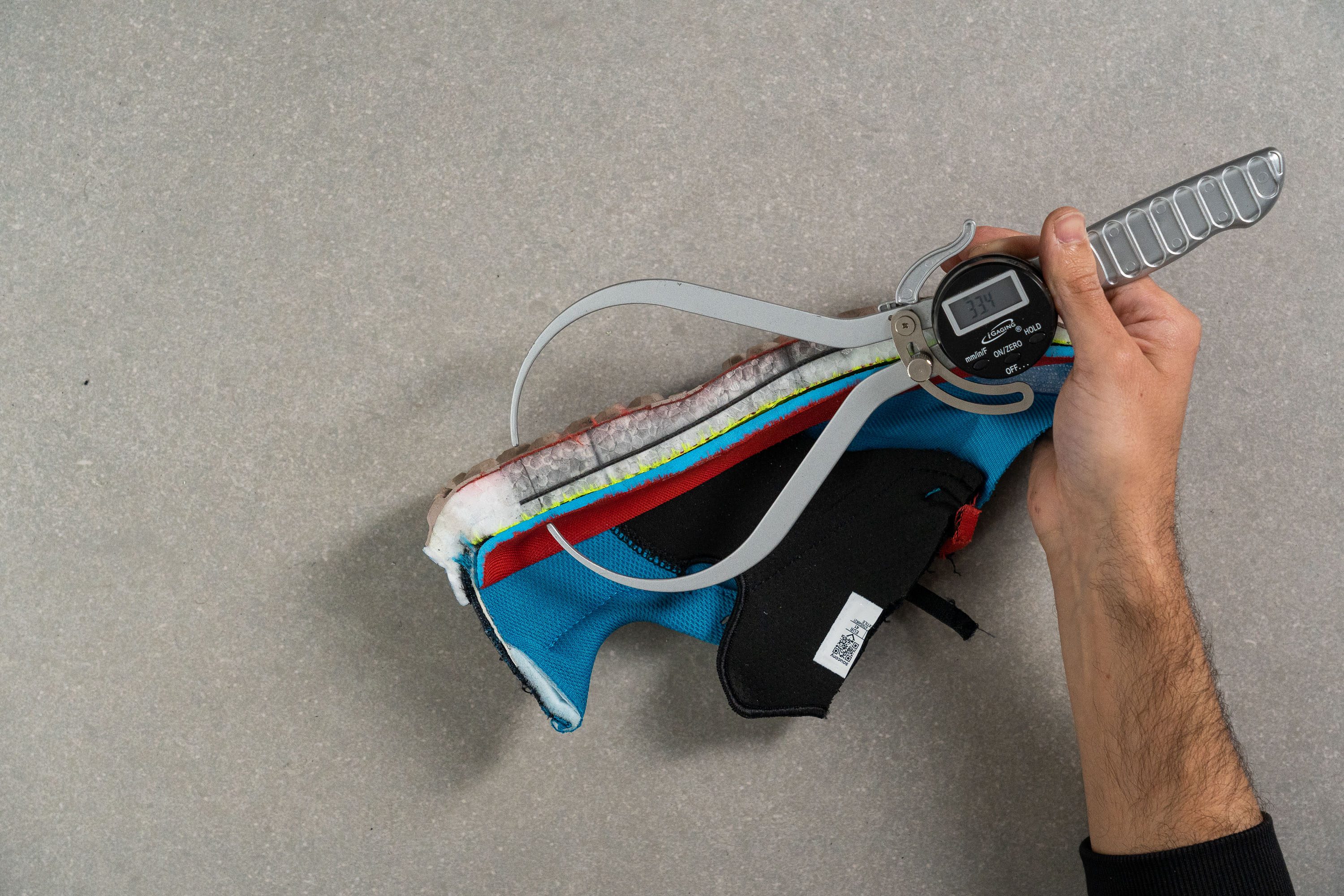
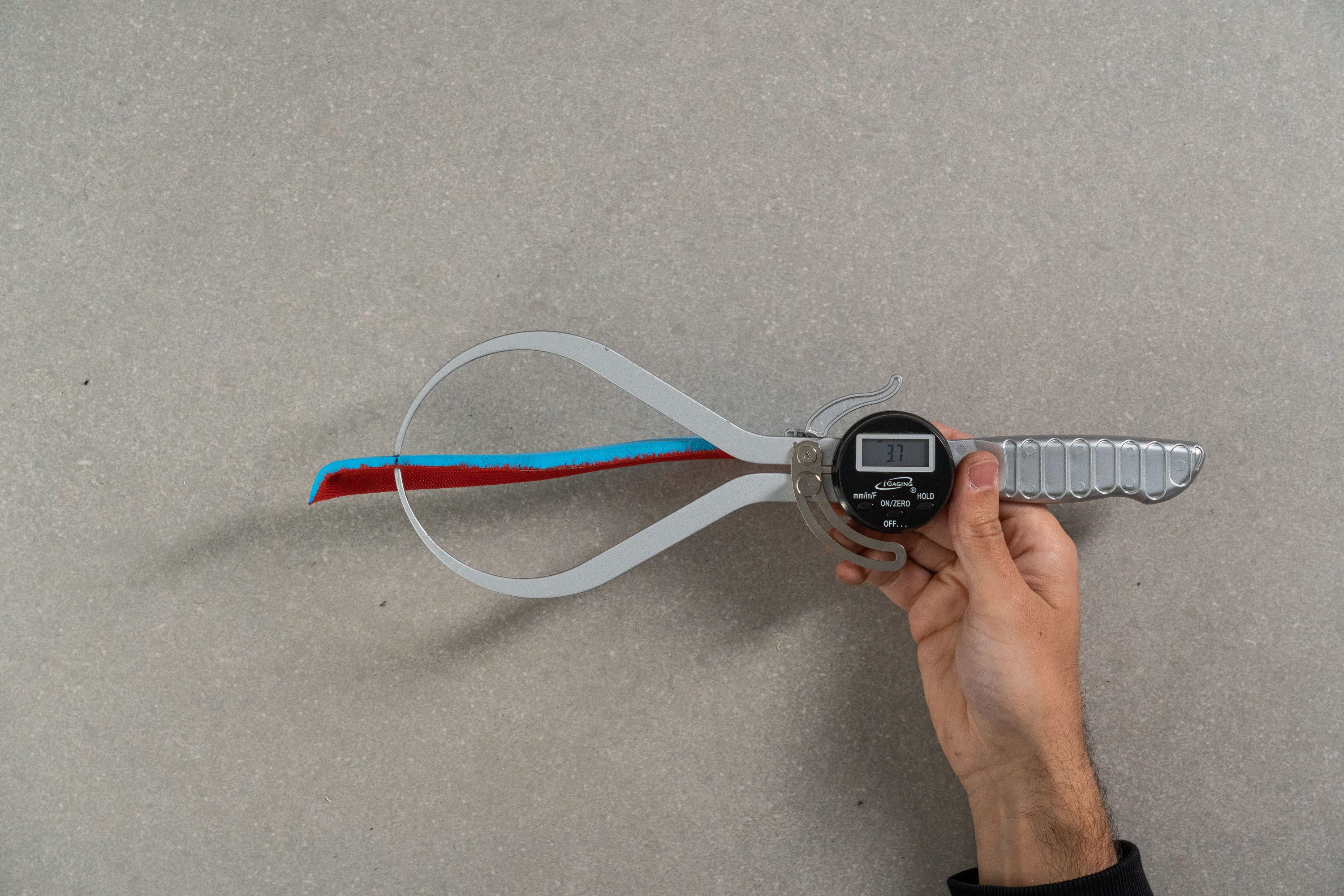
Ready to race...and win!
The combination of the high energy return given by the midsole, the snappy carbon plate, and the smooth and rockered ride felt mind-blowing and... even a little scary. That's because it takes willpower to slow down in this shoe!
We believe that the shoe's explosive ride justifies the shoe's hefty $200 price tag.
You better not slow down
It's clear that the Endorphin Edge is made for speed. Our attempts to run at a slow pace resulted in feeling highly unstable and even wobbly.
The stiffness of the carbon plate is one of the key features that help to keep runners on their toes in the Endorphin Edge. Measuring the shoe's resistance to bending, we found that it is 38% stiffer than running shoes on average.
However, it is not as stiff as its plated counterparts like the Endorphin Pro 3 (64% stiffer than the average).
This Saucony shoe proved to be a stiff one in our manual assessment too. On a 1-5 scale where 5 is the stiffest, we ranked the shoe as 5 on longitudinal flexibility and 4 on torsional one.
Grip is king in the Endorphin Edge
Whether you're running on rocky terrain, wet trails, puddles, creek crossings, or even mud, you can maneuver the Saucony Endorphin Edge with utmost confidence. And on the road? We found that it works on the pavement just fine!
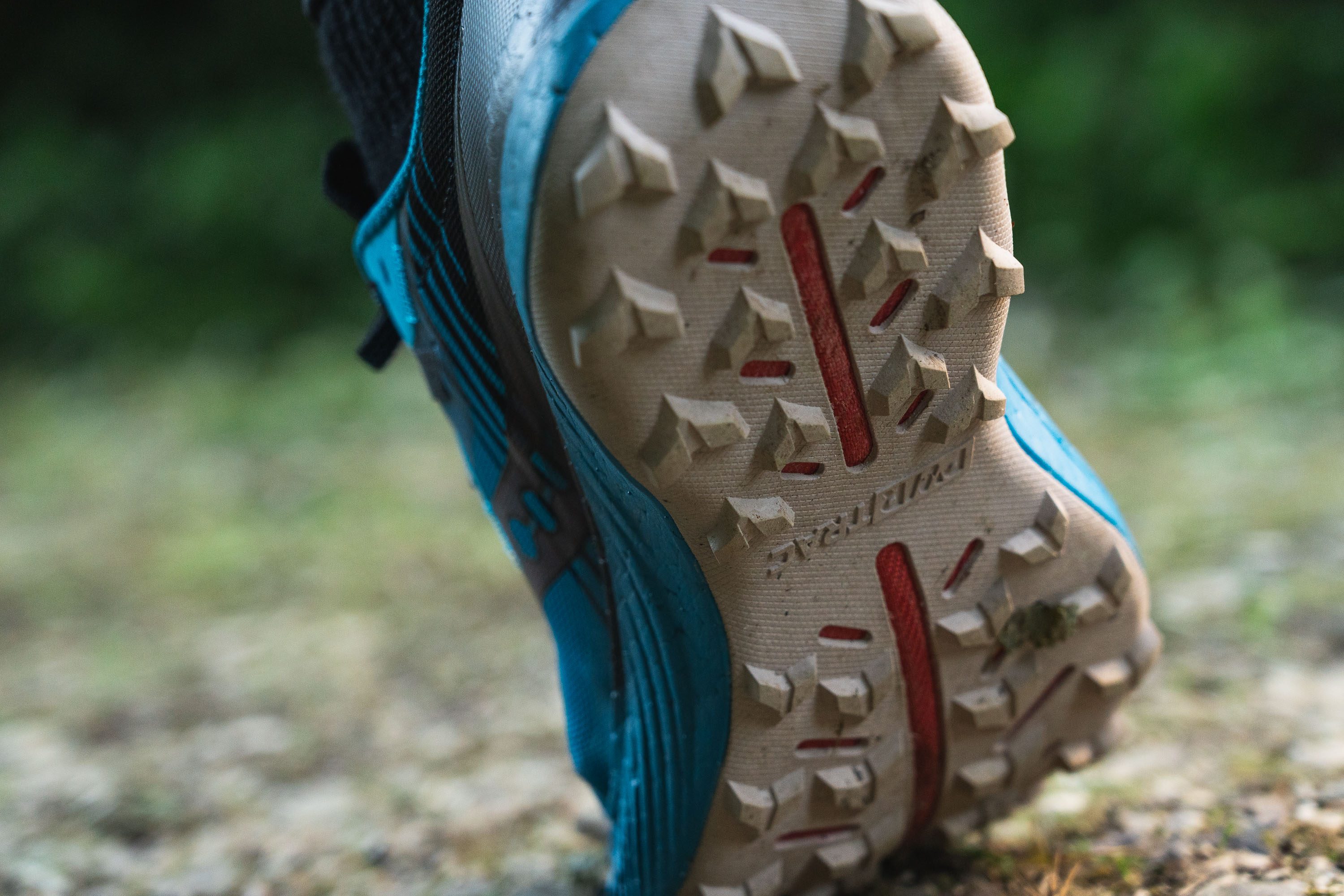
We measured the shoe's lugs at 3.4 mm. This is the standard lug depth for trail running shoes.
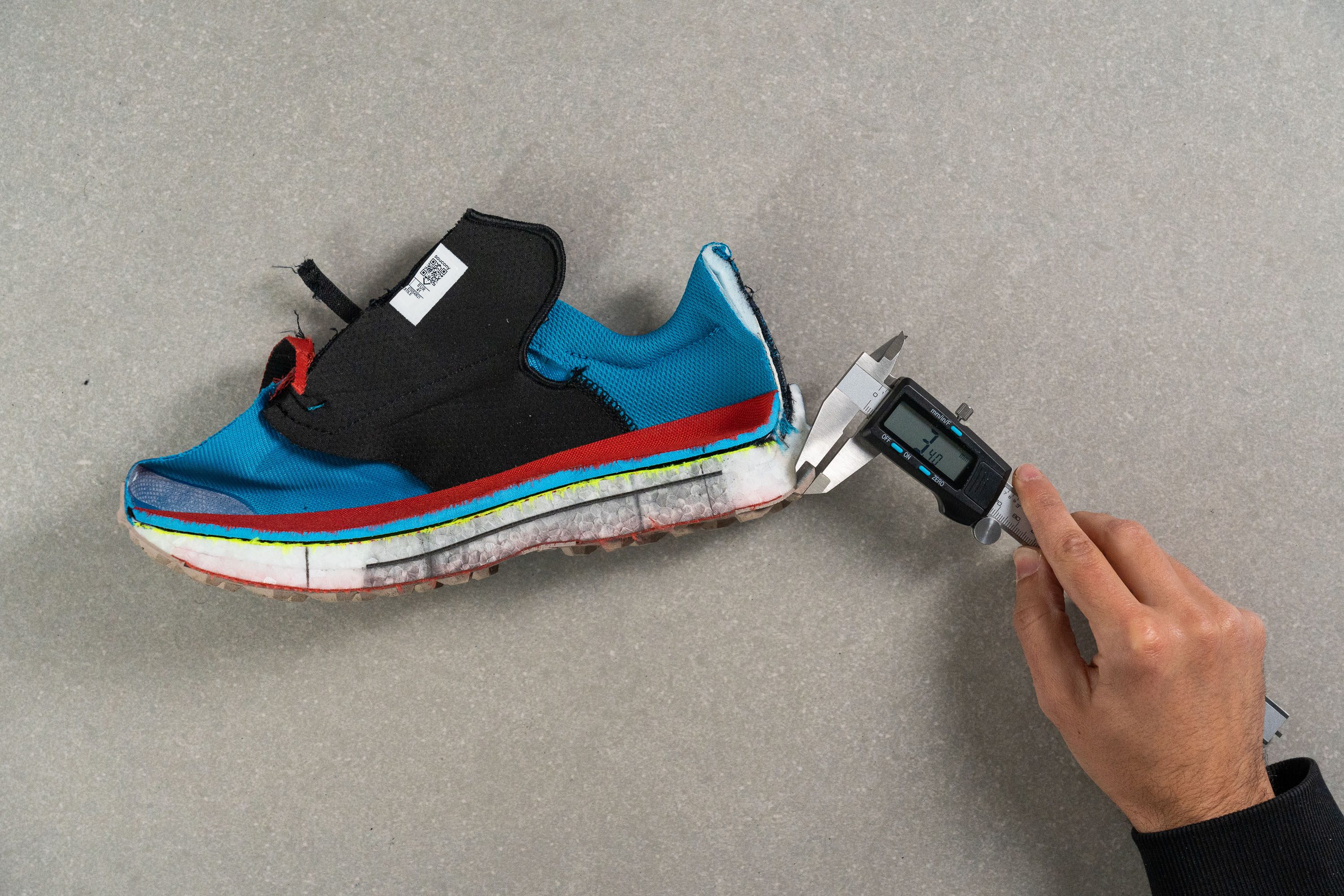
Endorphin Edge keeps you steady
We felt quite stable when cornering in this Saucony shoe. It has a solid amount of lateral support as well as a wide enough base to prevent the foot from rolling over.
Measuring the widest part of the shoe's sole with a caliper, we found that it is 112.6 mm in the forefoot and 88.2 mm in the heel. This is right at the average of trail running shoes.
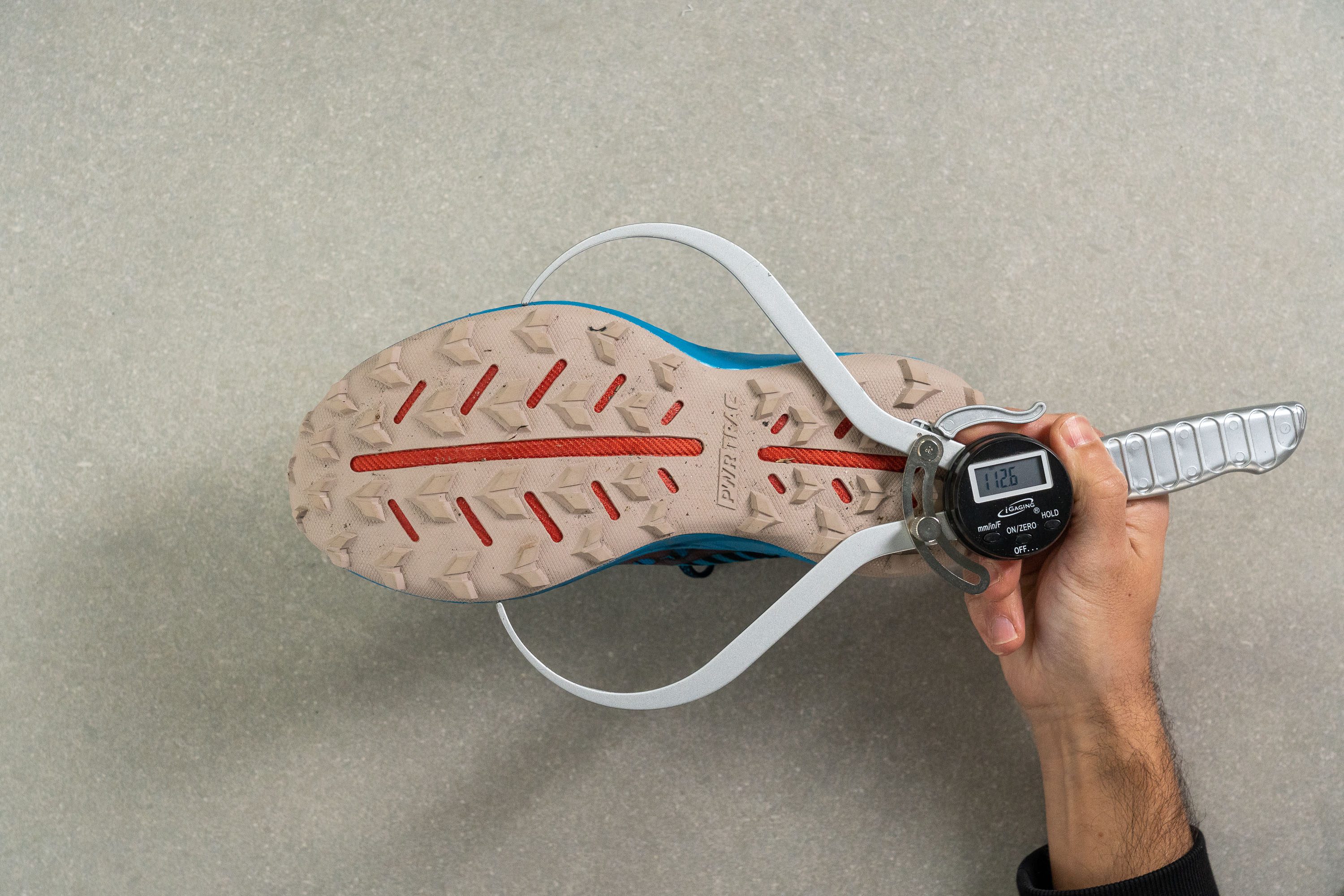
Fit: Takes the distance into account
Meaning to say it has a generous fit that bears foot swelling in mind.

The toebox has plenty of wiggle room. It even welcomes wide feet!
In case you struggle with heel slippage, the shoe comes with an extra pair of eyelets to tie a runner's knot.
